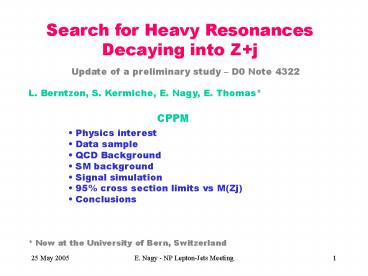Prsentation PowerPoint - PowerPoint PPT Presentation
Title:
Prsentation PowerPoint
Description:
Excited quarks can produce such a signal - quark substructure ' gauge ' interaction: Z 1j ... to discover quark substructure. However, thanks to the ... – PowerPoint PPT presentation
Number of Views:41
Avg rating:3.0/5.0
Title: Prsentation PowerPoint
1
Search for Heavy Resonances Decaying into Zj
Update of a preliminary study D0 Note 4322
L. Berntzon, S. Kermiche, E. Nagy, E. Thomas
CPPM
- Physics interest
- Data sample
- QCD Background
- SM background
- Signal simulation
- 95 cross section limits vs M(Zj)
- Conclusions
Now at the University of Bern, Switzerland
2
Physics interest
- Signal is clear instrumental background can
be neglected - Not yet explored
- Excited quarks can produce such a signal -gt
quark substructure
gauge interaction Z1j peak in MZj, pTZ,
pTj explored at present
contact interaction Z2j peak in MZj will
be studied later
3
Data sample
- 2EMhightpt Pass2 skim 2 loose electrons pt gt 15
GeV - TMBTree produced by p16.05.01 (thanks to Oana
Boeriu) - duplicated events removed
- 4 407 181 events selected
pre-V12 EM_MD12_CEM10
2EM_HI EM_HI_SH 2EM_2MD7
EM15_2JT15 EM_MX 2EM_2MD12
EM_HI_METSH 2EM_MD10_CEM10 V12 and V13
E1_2L15_SH15 E1_2L20 E3_2SH8
E2_2L8_T8L8 E1_SHT20 E3_5_11_SH5_T4L5
3J15_2J25_PVZ E1_SH30 E2_2L15_SH15
E3_SHT15_2J_HT50 3JT15_PVZ
E1_SH15_2J20_M10 E1_L20_M25
Out of 836 triggers 22 selected triggered 99.8
of skimmed events
Trigger efficiency determined using µ triggers
(15437 evts) is compatible with 100 for pte1 gt
30,
pte2 gt 20 GeV ? No correction will be applied,
only in the error it will be accounted for
4
Trigger efficiency
5
Preselection
6
Final selection
- gt1 em isolated object with at
- least 1 associated track e/-
- in fiducial ECHMX8lt20, CCHMX7lt10
- pT1gt30, pT2 gt 25 GeV
- Zvert lt 50 cm
- 22171 evts
- at least 1 Z 81 lt Mee lt 101 GeV
- 20122 evts
- at least 1 confirmed jet
- pTgt10 GeV
- 3860 evts
Very clean Z signal, almost no background
Lint 370 /- 22 pb-1 used
7
Instrumental (QCD) Background
mix-up between electromagnetic and hadron jets
- Z signal disappears only when veto on
- track match and HMX inverted
- With track match veto only one has Z
- signal, DY-Z interference and QCD bg
- We assume in MC QCD bg is negligible
- Fit simultaneousely Data and MC with
- Gaussian Z signal (same width),
- DY and QCD bg (same slope)
NQCD 44.46 /- 7.60 M1 81, M2 101 GeV NZ
20122 NQCD/NZ 0.0022/-0.0004
dNQCD/dM C e-bM NQCD C/b(e-bM1-e-bM2) b
0.0278 GeV-1 C 26.74 /- 4.58 GeV-1
QCD background is negligible
8
SM Background
Inclusive production of Z has been generated by
Pythia
2?2 process with variable MZq threshold 200,
300, 400 GeV Best agreement is obtained when
combinig the 4 samples but the result is stable
if one combines 2?1 with only the 200 or 300 GeV
samples
- Data (with error bars) and
- MC (histogram)
- w/o topological (pTj1 cut)
- MC events are normalized to the
- total number of data events
- This same normalization factor
- is used on each topological cut
9
Signal simulation
Spin ½ resonance with narrow width simulated for
M 300, 400, 500, 600, 700 GeV using the
qg?q?Zq model of Pythia
Typical Zj mass resolution 50 GeV Typical
acceptance (w/o topological cut) 16
eIDData/eIDMC 0.8 taken (has to be verified)
10
95 CL cross section upper limits
determined by the standard D0 procedure
Topological cut pTj1gtpTmin since it peaks at
M(q)/2 pTmin in 50 GeV steps has been varied
and optimum was chosen by minimizing the average
cross section upper limit
11
95 CL cross section upper limit
q production cross section x BR
M(Zj) lt 450 GeV excluded
12
(Un)sensitivity of the result to the simulation
of the background
200300400
200
300
400
1?2 only
300400
13
(Un)sensitivity of the result to the simulation
of the background
200300400
200
300
1?2 only
400
300400
14
Conclusions
- First result is presented on upper limits of
high - mass resonances decaying to Zj
- M(Zj) lt 450 GeV is excluded
- Due to the small BR(q?Zj, Z?ee-) the result
is - not competitive to discover quark
substructure - However, thanks to the extremely clean signal
- this channel is an excellent tool to verify
- possible signals
- One potential improvement is to add the Z?µµ-
- channel































